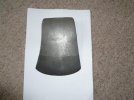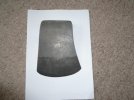- Joined
- Jan 16, 2012
- Messages
- 333
I have been reading with interest about the use of vinegar when restoring axes. It seems this is a popular practice with quite a few Americans. Most of my axes are of working standard, but I have just bought a couple that I may just re-hang and have as 'relics of the past'.
My question is...What type of vinegar, or does it matter? Malt, cider, white etc.
My question is...What type of vinegar, or does it matter? Malt, cider, white etc.


